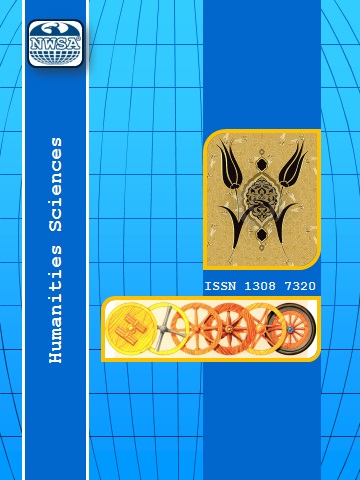References
[1] Atanasova, D., (2019). Moving society to a sustainable future: The framing of sustainability in a constructive media outlet. Environmental Communication, 13(5):700-711.
[2] Barkemeyer, R., Givry, P., and Figge, F., (2018). Trends and patterns in sustainability-related media coverage: A classification of issue-level attention. Environment and Planning C: Politics and Space, 36(5):937-962.
[3] Basiago, A., (1999). Economic, social and environmental sustainability in development theory and urban planning practice. The Environmentalist, 19:145-161.
[4] Bellotti, E. and and Panzone, L., (2016). Media effects on sustainable food consumption. How newspaper coverage relates to supermarket expenditures. International Journal of Consumer Studies, 40(2):186-200.
[5] Çevre Kanunu, (1983). T.C. Resmi Gazete, 2872, 11 Ağustos 1983.
[6] Çevre Kanununda Değişiklik Yapılmasına Dair Kanun, (2006). T.C. Resmi Gazete, 5491, 26 Nisan 2006.
[7] Diaconeasa, M.C., Popescu, G., Maehle, N., Nelgen, S., and Capitello, R., (2022). Media discourse on sustainable consumption in Europe. Environmental Communication, 16(3):352-370.
[8] Fischer, D., Haucke, F., and Sundermann, A., (2017). What does the media mean by sustainabilityor sustainable development? An empirical analysis of sustainability terminology in German newspapers over two decades. Sustainable Development, 25(6):610-624.
[9] Ghosh, A. and Boykoff, M., (2018). Framing sustainability and climate change: Interrogating discourses in vernacular and English-language media in Sundarbans, India. Geoforum, 99:142-153.
[10] Günay, D., İşeri, E., Ersoy, M., and Elega, A.A., (2021). Media framing of climate change action in carbon locked-indeveloping countries: Adaptation or mitigation? Environmental Communication, 15(5):663677.
[11] Jenkins, W., (2010). Berkshire encyclopaedia of sustainability: the spirit of sustainability (W. Jenkins and W. Bauman, Eds). Great Barrington: Berkshire Publishing Group.
[12] Karmasin, M. and Voci, D., (2021). The role of sustainability in media and communication studies curricula throughout Europe. International Journal of Sustainability in Higher Education, 22(8):42-68.
[13] Kaypak, Ş., (2013). Çevre sorunlarının çözümünde küresel çevre politikaları. Muğla Üniversitesi Sosyal Bilimler Enstitüsü Dergisi, (31):17-34.
[14] Keleş, R., (2023). Dünyada ve Türkiyede çevre politikaları ve sürdürülebilir kalkınma. Çevre Şehir ve İklim Dergisi, 2(3):24-30.
[15] Keleş, R., (1998). Kent Bilimleri Terimleri Sözlüğü. Ankara: İmge Yayınları.
[16] Klarin, T., (2018). The concept of sustainable development: From its beginning to the contemporary issues. Zagreb International Review of Economics and Business, 21(1):67-94.
[17] Larre, D., (1986), Çevre yönetimi konulu dünya sanayi konferansının sonuçları ve tavsiye kararları. Sanayi ve Çevre Konferansı, TÇSV, Ankara.
[18] Lee, Y., Park, S.A., Lee, H., Willis, E., and Cameron, G.T., (2019). Resources arent everything, but they do help: Assessing local TV health news to deliver substantive and useful health information. Journal of Communication in Healthcare, 12(1):13-22.
[19] Luhmann, N., (1989). Ecological communication. Chicago: University of Chicago Press.
[20] Newig, J., Schulz, D., Fischer, D., Hetze, K., Laws, N., Lüdecke, G., and Rieckmann, M., (2013). Communication regarding sustainability: Conceptual perspectives and exploration of societal subsystems. Sustainability, 5(7):2976-2990.
[21] Özmehmet, D.E., (2008). Dünyada ve Türkiye sürdürülebilir kalkınma yaklaşımları. Yaşar Üniversitesi Dergisi, 3(12):1853-1876.
[22] Redclif, M., (2005). Sustainable development (19872005): An oxymoron comes of age. Sustainable Development, 13:(212227).
[23] Reilly, A.H. and Larya, N., (2018). External communication about sustainability: Corporate social responsibility reports and social media activity. Environmental Communication, 12(5):621637.
[24] Remenyi, J., (2004). What is development?. In D. Kingsbury, J. Remenyi, J. McKay and J. Hunt, (Eds.), Key Issues in Development (pp:22-44). London: Palgrave Macmillan.
[25] Sachs, W., (1999). Environment. In W. Sachs (Ed.), The Development Dictionary: A guide to knowledge as power (2nd ed., pp:24-37). London: Zed Books.
[26] Schmidt, A., Ivanova, A., and Schäfer, M.S., (2013). Media attention for climate change around the world: A comparative analysis of newspaper coverage in 27 countries. Global Environmental Change, 23(5):12331248.
[27] Sharpley, R., (2009). Tourism Development and the Environment: Beyond Sustainability?. Earthscan.
[28] Shiva, V., (2010). Resources. W. Sachs (Ed.), The Development Dictionary: A guide to knowledge as Power (pp. 228-242). London: Zed Books.
[29] Summ, A. and Volpers, A.M., (2016). Whats science? Wheres science? Science journalism in German print media. Public Understanding of Science, 25(7):775790.
[30] UNDP, (2015). The Millenium Development Goals Report.
[31] Yıldırım, B., (2015). İçerik çözümlemesi yönteminin tarihsel gelişimi uygulama alanları ve aşamaları. (Editör: Besim Yıldırım), İletişim araştırmalarında yöntemler içinde, Konya: Literatürk Yayınları.
[32] Weder, F., Voci, D., and Vogl, N.C., (2019). Lack of problematization of water supply use and abuse of environmental discourses and natural resource related claims in German, Austrian, Slovenian and Italian media. Journal of Sustainable Development, 12(1):39-54.
 +90(533) 652 66 86
+90(533) 652 66 86 nwsa.akademi@hotmail.com
nwsa.akademi@hotmail.com Fırat Akademi Samsun-Türkiye
Fırat Akademi Samsun-Türkiye
